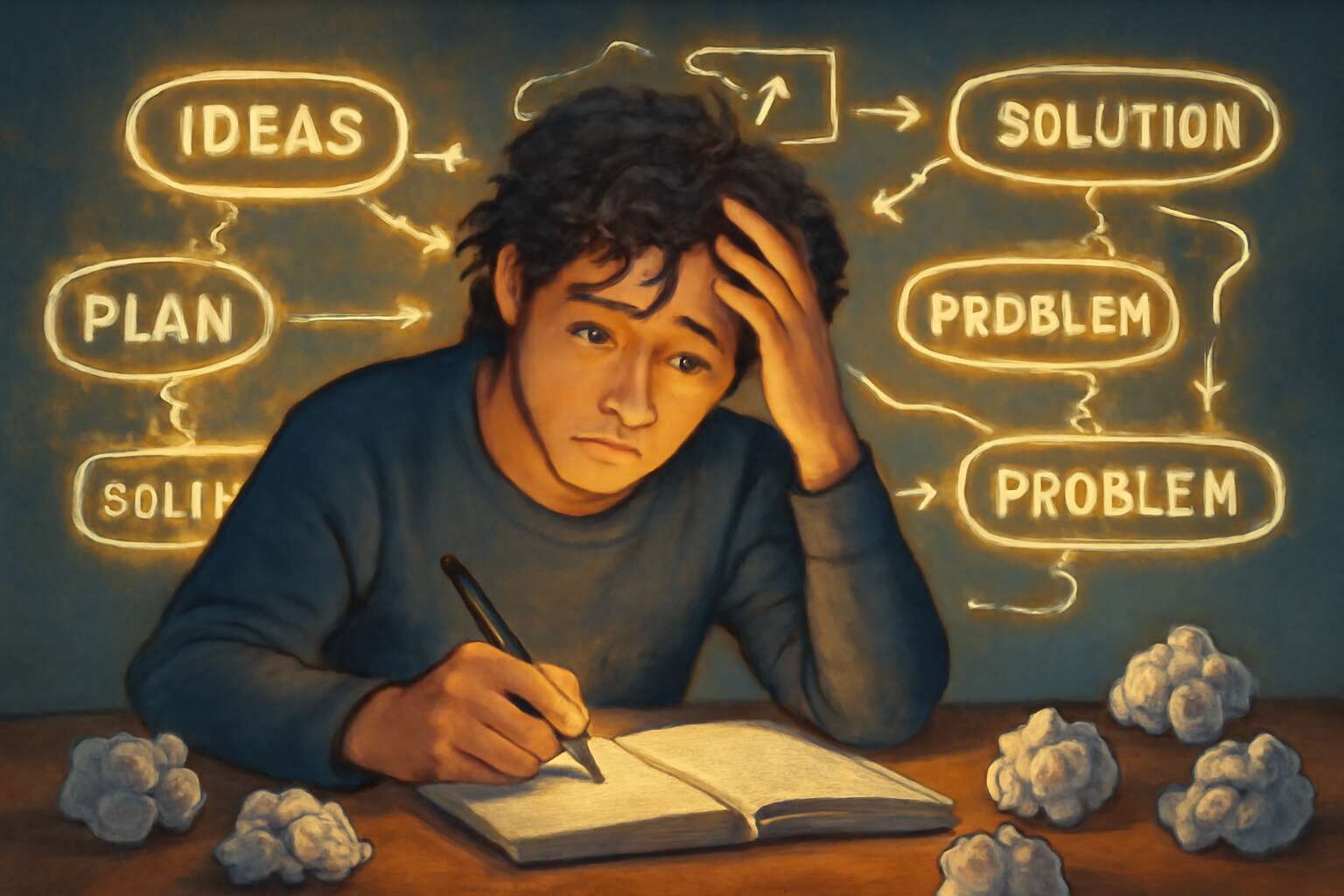Understanding the Phrase “Racking My Brain”
Definition and Meaning – Exploring the literal and idiomatic interpretation of the phrase
When someone asks, “what is racking my brain,” they’re often describing a moment of intense mental struggle. It’s a phrase that captures the sensation of being caught in a whirlwind of thoughts, desperately searching for clarity. While it might seem like a simple idiom, its roots delve deeper into the metaphor of mental exertion—like trying to fit a complex puzzle together in your mind.
In its literal sense, “racking” refers to the act of causing pain or strain, often associated with physical discomfort. Applied figuratively, it vividly illustrates the emotional and cognitive toll of problem-solving or decision-making. This phrase resonates universally, whether someone is grappling with a personal dilemma or trying to crack a tough business challenge. Understanding what is racking my brain means recognizing that our minds can become overwhelmed when faced with difficult questions or unresolved issues.
Sometimes, it helps to consider the stages of mental racking:
- Identifying the core problem
- Weighing possible solutions
- Experiencing moments of doubt and frustration
By exploring this phrase’s idiomatic and literal interpretations, we gain a richer understanding of how language vividly captures our inner struggles—especially amid the complexities of life in South Africa, where every decision can feel like a mental marathon. So, when someone says they’re racking their brain, it’s more than just an expression; it’s a testament to the human condition—tired, persistent, and hopeful for clarity.
Origin and Etymology – Historical background and evolution of the expression
The phrase “racking my brain” has a rich history that reveals much about how language evolves to express human emotion. Its origins trace back centuries, rooted in the physical act of causing pain or strain, often linked to torture devices known as “racks” used in medieval times. Over time, this intense imagery was metaphorically adopted to describe the mental agony of trying to solve complex problems. In the 17th and 18th centuries, writers began using “racking” to depict the emotional toll of persistent thought, transforming it into the idiomatic expression we recognize today.
Interestingly, the phrase’s evolution reflects a universal human experience—the struggle of grappling with difficult questions. When someone asks, “what is racking my brain,” they’re invoking this historical imagery of mental torment. The expression encapsulates the physical sensation of mental fatigue, with the “racking” symbolizing both the effort and the pain of intense concentration. It’s a vivid reminder of how language vividly captures the human condition, especially in moments when clarity feels just out of reach.
Throughout the centuries, the phrase has become deeply embedded in everyday speech, often used to describe the relentless process of problem-solving. Whether working through a personal dilemma or tackling a complex challenge in business, people in South Africa and beyond understand the weight of “what is racking my brain.” It’s a testament to our shared experiences of mental perseverance, echoing a history of struggle and resilience that continues to resonate today.
Common Uses in Daily Life – Situations where people typically say “racking my brain”
In the shadowed corridors of our minds, there lies a moment when clarity slips just beyond reach. It’s in these turbulent pauses that the phrase “what is racking my brain” whispers its haunting refrain, capturing the weight of mental torment. This expression is often uttered during those sleepless nights when solutions seem as distant as a mirage, leaving us to wrestle with the shadows of doubt. When confronted with a problem that refuses to yield, the phrase becomes a mirror reflecting our inner struggle, an echo of the relentless pursuit of understanding.
People in South Africa frequently find themselves saying “what is racking my brain” during moments of intense deliberation—whether trying to solve a complex work dilemma or unravel a personal mystery. It’s a visceral declaration of the relentless effort to pierce the darkness of confusion. Common situations include:
- Deciphering a cryptic message that holds the key to a hidden truth
- Figuring out a solution to a seemingly unsolvable problem
- Trying to recall a long-forgotten piece of vital information
In these instances, the phrase captures more than just mental fatigue; it embodies the very essence of human perseverance amid chaos. The darkness inside our minds can feel like a relentless torment, yet it’s also a testament to our indomitable spirit—struggling, searching, and ultimately seeking the elusive light of understanding.
Synonyms and Related Phrases
Alternative Expressions – Different ways to express mental strain or deep thought
When someone asks, “What is racking my brain?” they’re usually describing that peculiar state of mental overload—an intellectual tug-of-war where clarity seems just out of reach. Instead of saying, “I’m thinking hard,” you might opt for more colorful expressions that capture the depth of your contemplative torment. For example, you could say you’re “burdened with a mental knot,” or that your mind is “in a whirl.” Such phrases evoke a vivid image of the cognitive chaos that often accompanies deep thought or problem-solving.
To diversify your vocabulary, consider these alternative expressions:
- “My mind is in a tangle”
- “My thoughts are entangled”
- “I’m battling a mental labyrinth”
- “My brain is on a treadmill”
- “My thoughts are spinning out of control”
Each phrase subtly highlights the complexity and frustration behind the act of racking one’s brain—an experience universally understood yet often expressed in uniquely colorful ways. Whether in South Africa or elsewhere, these alternative expressions serve as linguistic tools to articulate the depths of mental exertion, making the abstract notion of “what is racking my brain” both relatable and vividly descriptive.
Differences Between Similar Phrases – Comparing “racking my brain” with terms like “brainstorming” or “pondering”
Amid the labyrinth of language, understanding the subtle distinctions between phrases like “racking my brain,” “brainstorming,” and “pondering” can transform mere communication into a nuanced art. While these expressions all evoke mental exertion, each carries a distinct connotation that reveals the depth and nature of cognitive engagement. For instance, “brainstorming” often signifies a creative surge—an open, collaborative effort to generate ideas—whereas “pondering” suggests a more deliberate, contemplative process, usually involving reflection on complex issues. In contrast, “what is racking my brain” conveys a visceral sense of mental strain, an almost visceral tug-of-war within the mind, often accompanied by frustration or urgency. This phrase encapsulates that intense scramble for clarity, making it especially poignant in moments of decision-making or problem-solving.
- “Racking my brain” emphasizes mental overload—an exhausting attempt to find answers or solutions.
- “Brainstorming” leans toward spontaneous idea generation without immediate judgment.
- “Pondering” reflects a slow, methodical process of weighing options or contemplating abstract concepts.
Understanding these distinctions enriches the way we express cognitive struggles, helping us articulate the particular flavor of mental effort we experience. Whether you’re tangled in a mental knot or simply exploring possibilities, recognizing the nuances between these related phrases enhances both clarity and emotional resonance in communication—especially in contexts where the question “what is racking my brain” might be more than just a figure of speech, but a window into the depths of human thought.
Psychological Aspects of Racking Your Brain
Mental Fatigue and Stress – How overthinking affects mental health
When I ask myself, “what is racking my brain,” I realize it’s often a sign of mental fatigue creeping in. Prolonged overthinking can drain not just your mental reserves but also amplify stress levels, creating a vicious cycle that hampers clarity and decision-making. This relentless mental strain can lead to feelings of frustration and exhaustion, making it harder to focus or find solutions.
Studies reveal that persistent overthinking linked to racking your brain can trigger physiological responses similar to stress, such as increased cortisol levels, which further impair cognitive function. It’s no wonder that mental health takes a hit when the mind is overstretched. For many, this manifests as irritability, anxiety, or even burnout. Recognizing these psychological aspects is crucial, as they underscore how deeply the mind and body are interconnected during episodes of intense mental exertion.
In such moments, some people find it helpful to categorize their thoughts or prioritize pressing issues. This mental sorting process can ease the burden and reduce the feeling of being overwhelmed. After all, understanding what is racking my brain isn’t just about pinpointing the problem; it’s about acknowledging the toll it takes and seeking ways to manage that internal chaos effectively.
Cognitive Load and Problem-Solving – The impact of intense mental effort on problem resolution
When faced with complex problems or tough decisions, many of us find ourselves asking, “what is racking my brain?” This phrase encapsulates the intense mental effort we exert during moments of deep thought. At the core of this experience is cognitive load—the mental capacity required to process information. As cognitive load increases, our ability to problem-solve diminishes, leading to frustration and mental fatigue. The brain can only handle so much at once, and pushing beyond that limit hampers effective decision-making.
Intense mental effort often triggers a phenomenon known as mental overload, which can significantly impair problem resolution. When your mind is overwhelmed, solutions seem distant, and clarity becomes elusive. To cope, some individuals inadvertently engage in mental sorting—breaking down complex issues into manageable parts. This process can alleviate the pressure, but if unchecked, it may lead to further exhaustion. Understanding what is racking my brain isn’t just about recognizing the mental strain but also about appreciating how cognitive load influences our ability to think critically. Recognizing these psychological aspects helps us better navigate the internal chaos that often accompanies deep thought.
When Do People Say They Are Racking Their Brain?
Common Scenarios – Decision-making, solving complex problems, creative thinking
When do people say they are racking their brain? It’s often during moments when the mind is a labyrinth of tangled thoughts, seeking clarity amidst chaos. In the vibrant tapestry of daily life, we frequently find ourselves saying, “what is racking my brain,” especially during critical decision-making. Whether pondering a career move, debating which course of action to take, or solving complex problems that seem to have no immediate solution, this phrase captures the essence of mental exertion.
Creative thinking also becomes a battleground where the mind is pushed to its limits. Artists, writers, and innovators often find themselves racking their brain to unlock inspiration or refine ideas. In these instances, the mental strain is palpable, and the phrase perfectly encapsulates the relentless effort of deep thought. So, whether it’s navigating life’s hurdles or unraveling intricate puzzles, the act of racking one’s brain is an enduring testament to human perseverance.
Emotional Responses – Feelings of frustration, confusion, or determination
Ever found yourself staring at a problem, your mind a whirlwind of chaos, asking, “what is racking my brain?” It’s that moment when frustration bubbles just beneath the surface, mingling with a flicker of determination. Feeling confused or overwhelmed isn’t just a personal quirk; it’s a universal human experience that hits during intense decision-making or when faced with a seemingly insurmountable challenge.
Emotionally, racking your brain often stirs a cocktail of feelings—frustration when solutions seem just out of reach, confusion over complex issues, and, occasionally, a stubborn resolve to crack the code. It’s as if your mind is caught in a tug-of-war, each thought vying for dominance. This mental strain can feel exhausting, yet it also sparks a fierce drive to push through the chaos. The next time your thoughts spiral in a whirlwind, remember, you’re simply navigating the storm of what is racking my brain—an essential part of human perseverance.
Tips to Avoid Overthinking and Improve Clarity
Mindfulness and Relaxation Techniques – Reducing mental clutter
When the mind is a tempest, swirling with indecision and relentless thoughts, it’s easy to feel overwhelmed—like drowning in a sea of mental clutter. Understanding what is racking my brain often reveals a deeper need for clarity amidst chaos. To tame this storm, mindfulness and relaxation techniques serve as anchors, grounding us in the present moment and easing the relentless mental chatter.
Practicing simple mindfulness exercises—such as deep breathing or focusing on the sensations of each breath—can significantly reduce mental clutter. These techniques help clear the fog of overthinking, allowing fresh perspectives to emerge. For those seeking a calmer mental state, incorporating regular relaxation practices can be transformative. It’s amazing how just a few minutes of focused calm can serve as a mental reset, illuminating the path forward.
Some effective strategies include:
- Engaging in mindful meditation to foster inner stillness.
- Practicing progressive muscle relaxation to release built-up tension.
- Setting aside dedicated time to disconnect from digital distractions and reflect.
By weaving these techniques into daily routines, one can gradually diminish the mental load and better understand what is racking my brain. Clarity becomes attainable, not as an elusive ideal but as a tangible state—an oasis for the weary mind seeking respite amid life’s relentless demands.
Practical Problem-Solving Strategies – Structured approaches to difficult questions
When the weight of complex decisions bears down, it’s easy to spiral into overthinking, losing sight of clarity. To navigate what is racking my brain, adopting practical problem-solving strategies can be transformative. Embracing a structured approach helps disentangle tangled thoughts and find focus amid chaos.
One effective method is to break down overwhelming questions into manageable parts. For example, using an ordered list to analyze each element of a problem fosters clarity and reduces mental clutter. It’s fascinating how this technique not only simplifies difficult questions but also restores confidence in decision-making.
Additionally, engaging in mindfulness can serve as a mental reset. When feelings of frustration or confusion set in, pausing and reflecting allows the mind to reset, making solutions more accessible. Sometimes, stepping back from the storm of thoughts reveals the simplest answers—those hidden behind the fog of overthinking.
SEO and Digital Content Considerations
Keyword Optimization Tips – Using related keywords to boost search rankings
In the labyrinth of thought, where ideas collide and clarity teeters on the edge of chaos, understanding what is racking my brain becomes a beacon for those lost in mental tumult. This phrase, poetic in its imagery, captures the essence of deep, relentless pondering that often feels like an internal storm. It’s a reflection of the cognitive load we carry when faced with complex dilemmas or impossible decisions, each thought intensifying the weight on our minds.
To truly grasp the depths of this phrase, consider how related keywords such as mental fatigue and problem-solving intertwine with it. When your mind is overwhelmed, every solution seems distant, slipping through mental fingers like grains of sand. But understanding what is racking my brain isn’t just about recognizing mental strain—it’s about appreciating the poetic struggle of pushing boundaries within the mind’s vast, uncharted territories.
Content Strategies for Engagement – Creating valuable content around mental effort and problem-solving
In the intricate dance of thought, where ideas swirl and clarity dissolves into a haze of mental fog, understanding what is racking my brain becomes a vital compass. It is a poetic reflection of the cognitive tempest that rages within us when faced with complex dilemmas or seemingly insurmountable choices. This phrase captures the essence of mental endurance, illustrating the relentless pursuit of clarity amid chaos.
When exploring how to optimize digital content, it’s essential to recognize that phrases like what is racking my brain serve as powerful anchors for SEO. By weaving related keywords such as mental fatigue and problem-solving into your narrative, you create a web that draws search engines closer. This approach not only elevates your search rankings but also enriches the reader’s journey, turning abstract turmoil into compelling storytelling.
Consider this: a strategic use of related keywords can transform a simple phrase into a beacon for those lost in the labyrinth of their own thoughts. Through thoughtful content strategies—be it in blog posts, articles, or social media—emphasizing the poetic struggle of deep thinking can resonate profoundly. It is in these moments of mental exertion that your audience finds both empathy and insight, making your content a memorable refuge amid the digital noise.




0 Comments